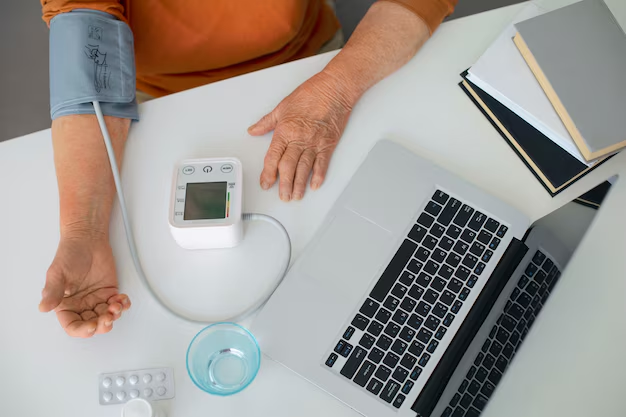Does Feeling Anxious Raise Your Blood Pressure? Here's What You Need to Know
It's a familiar scenario: you're about to give a presentation, head into an important meeting, or confront a challenging situation, and suddenly, you feel your heart pounding in your chest. You might even sense a subtle warmth rising in your face. Many people assume this is their blood pressure spiking. But is that really the case? Let's explore the intricate relationship between anxiety and blood pressure, unraveling myths, and offering insights into maintaining both mental and cardiovascular health.
The Basics: Anxiety and Blood Pressure
Anxiety is a natural response to stress. It's the body's way of preparing to face or escape a perceived threat, often referred to as the "fight-or-flight" response. This physiological reaction can lead to several changes within the body, including increased heart rate, shallow breathing, and heightened alertness.
How Anxiety Temporarily Affects Blood Pressure
When you experience anxiety, your body releases stress hormones like adrenaline and cortisol. These hormones can cause:
- A temporary increase in heart rate.
- Narrowing of blood vessels, which contributes to a rise in blood pressure.
In most cases, this spike in blood pressure is short-lived. Once the anxious event or thought passes, blood pressure typically returns to its baseline.
Chronic Anxiety and Long-term Blood Pressure Risks
While occasional anxiety-induced blood pressure changes are mostly harmless, chronic anxiety or stress can potentially contribute to long-term cardiovascular risks. Here's how:
- Consistent stress hormone levels can keep blood pressure elevated more often than not.
- Increased blood pressure over time can lead to hypertension, a condition that presents serious health risks if left unmanaged.
Distinguishing Between Anxiety and Hypertension Symptoms
Anxiety and hypertension can share similar symptoms, leading to confusion:
- Chest pain
- Shortness of breath
- Heart palpitations
Key Difference: Unlike hypertension, anxiety often comes with feelings of intense fear or dread. Understanding this difference is crucial for addressing the root cause of your symptoms.
Lifestyle Factors: Managing Anxiety and Blood Pressure
Addressing anxiety and its impact on blood pressure often involves lifestyle adjustments. Here are some ways to manage both:
Diet and Exercise
- Eat a balanced diet: Opt for fruits, vegetables, lean proteins, and whole grains. Avoid excessive salt and caffeine, known for raising blood pressure.
- Regular physical activity: Exercise can reduce anxiety and lower blood pressure. Aim for at least 150 minutes of moderate-intensity exercise weekly, such as walking or cycling.
Stress Management Techniques
- Deep breathing exercises: These can help reduce anxiety by calming the nervous system.
- Mindfulness and meditation: Regular practice can cultivate relaxation, reducing both anxiety levels and blood pressure.
Adequate Sleep
- Maintain a consistent sleep schedule. Poor sleep can exacerbate both anxiety and hypertension.
When to Seek Help
It's important to know when changes in anxiety and blood pressure warrant professional attention. See a healthcare provider if you:
- Experience persistent high blood pressure.
- Have anxiety that's interfering with your daily life.
- Notice symptoms such as chest pain that might indicate a more serious condition.
Mental Health Support
Therapies for anxiety, such as cognitive behavioral therapy (CBT), can effectively reduce anxiety symptoms and, subsequently, its impact on blood pressure. A mental health professional can guide you toward appropriate treatment.
FAQs: Unraveling Common Misconceptions
Q: Can anxiety cause permanent high blood pressure?
A: While anxiety itself doesn't cause lasting hypertension, chronic stress related to anxiety can contribute to a long-term increase in blood pressure. It's the consistent exposure to stress hormones that can impact cardiovascular health over time.
Q: Are blood pressure medications helpful for anxiety-related spikes?
A: Blood pressure medications are typically prescribed for managing chronic hypertension and may not address the root of anxiety-induced spikes. Exploring anxiety treatments might be a more effective approach for addressing the underlying cause.
Q: How can I differentiate between normal anxiety and an anxiety disorder?
A: Occasional anxiety in response to stress is normal. However, if anxiety persists, feels overwhelming, and hinders daily functioning, it may indicate an anxiety disorder, warranting professional evaluation.
Embracing a Holistic Approach
Understanding the connection between anxiety and blood pressure highlights the importance of a holistic health approach. Focusing solely on one aspect may not be as effective as embracing comprehensive well-being strategies.
Taking proactive steps toward mental wellness and cardiovascular health efficiently manages anxiety's physical manifestations. Remember, the goal is to enhance quality of life by finding balance and resilience in the face of stressors.
Final Thoughts: Empowering Your Health Journey
Your journey toward health is as unique as you are. Recognizing the signs of anxiety and its influence on blood pressure empowers you to take informed steps. Whether through lifestyle adjustments, seeking professional support, or practising stress-relief techniques, regaining control over your health is within reach.
Summary of Practical Tips:
- 🧘♂️ Practice relaxation techniques: Incorporate meditation and deep breathing.
- 🍎 Adopt a heart-healthy diet: Limit salt, caffeine, and consume balanced meals.
- 🏃♀️ Stay active: Engage in regular physical activity to reduce stress and improve heart health.
- 🛌 Prioritize sleep: Maintain a consistent and quality sleep routine.
- 👐 Seek support: Never hesitate to reach out to professionals if anxiety feels overwhelming or if you have concerns about your blood pressure.
By staying informed and proactive, you can effectively manage anxiety's impact on your health, ensuring a more balanced and fulfilling life.

